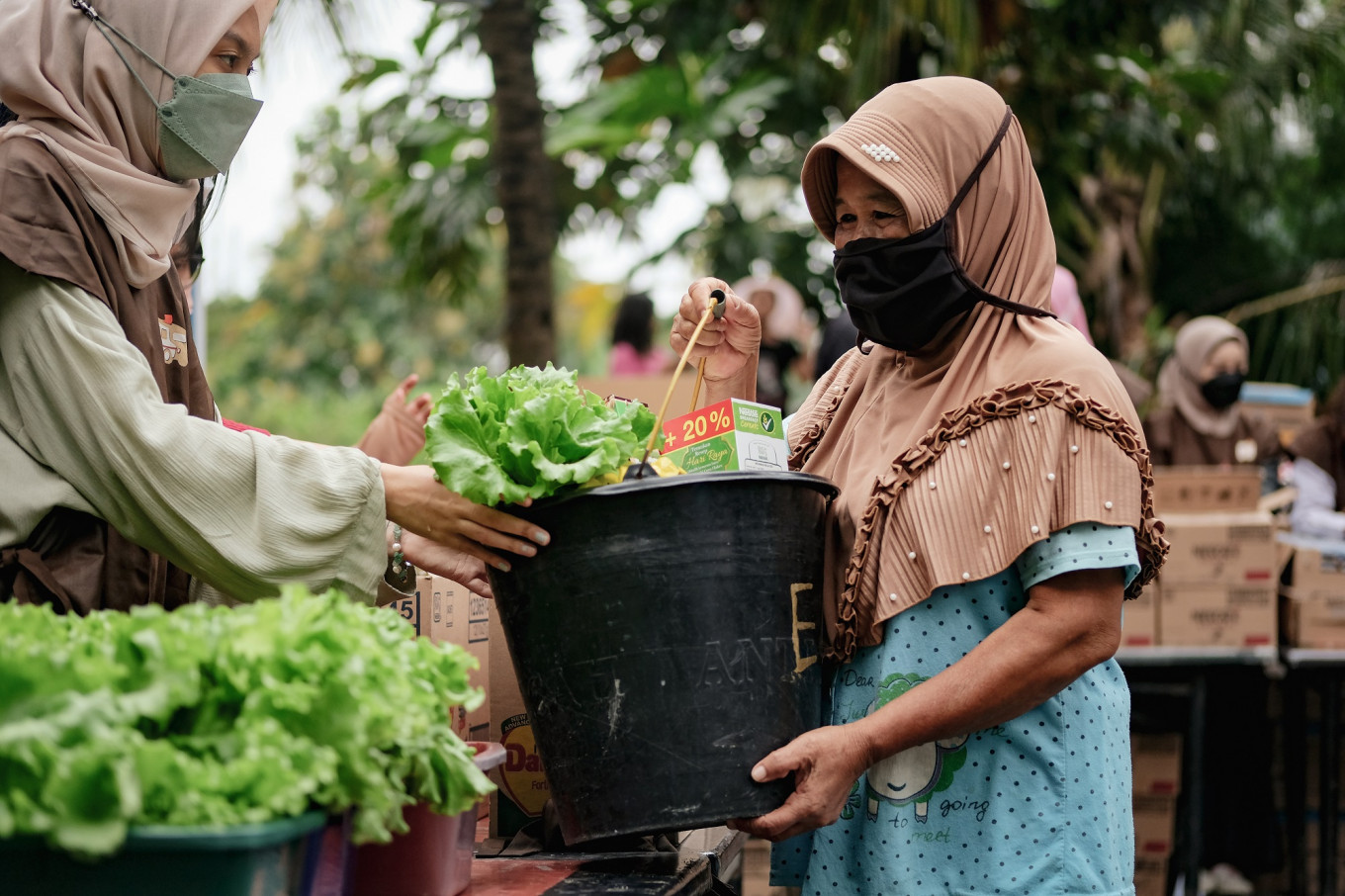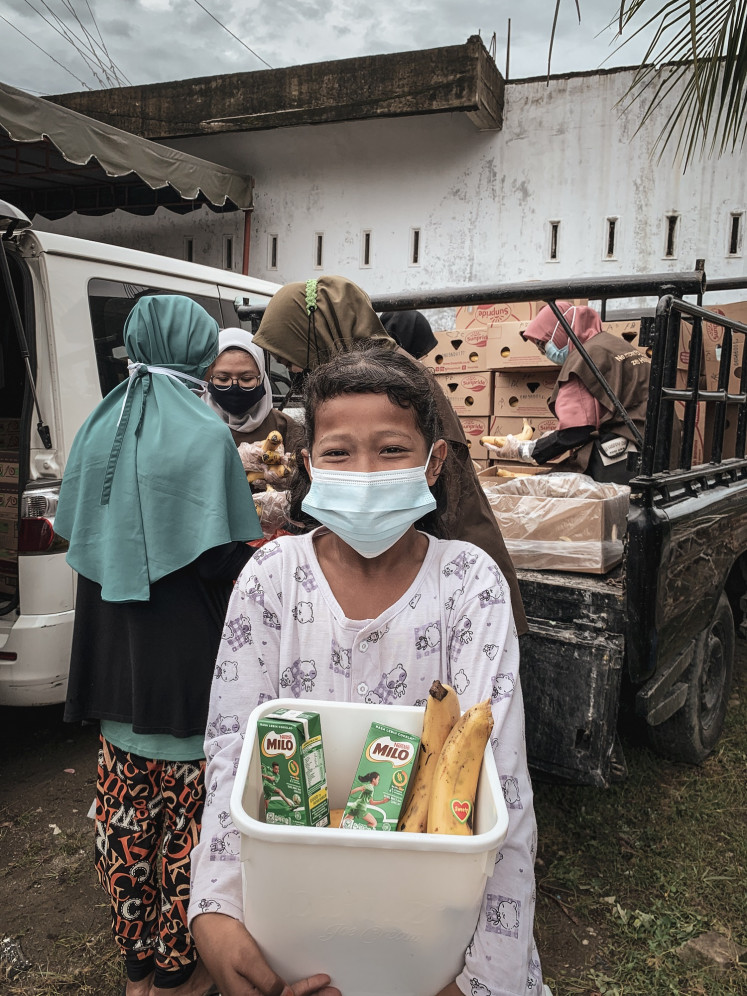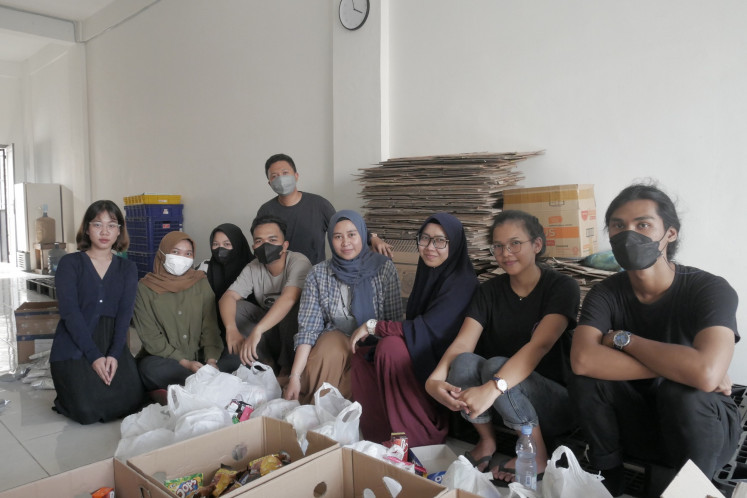Popular Reads
Top Results
Can't find what you're looking for?
View all search resultsPopular Reads
Top Results
Can't find what you're looking for?
View all search resultsIndonesian food banks try to tackle food waste and climate change issue
Change text size
Gift Premium Articles
to Anyone
T
ons of food ends up in landfills every year, adding to climate change and hunger issues. What should we do to mitigate these problems?
Eva Simanjuntak finds herself annoyed whenever her husband and children don’t finish the meal she’s prepared for them. The 43-year-old often bags the leftovers to give to the security officers in her residential complex in Simpang Selayang, Medan, North Sumatra.
"I feel sad when I see food being thrown away. If [the food I cook] doesn't get eaten, I’d rather give it to those who need it than waste it," she told The Jakarta Post.
Eva’s story and stance are common. Indonesians are aware of the food problem and in their own ways, try to be part of the solution.
One solution
One solution to the food waste issue is food banks that distribute food that was originally going to be disposed of to those who need it or have limited access to food. Food banks also collect and store food from various sectors and hand it to underprivileged people.
"Food banks are a solution [to food waste issue] that has been implemented in several developed countries. Recently, it was adopted in some developing countries, including Indonesia, which, as far as I know, only has six [food banks],” said Siti Suci “Laras” Larasati, founder and CEO of the Aksata Pangan Foundation, a food bank in North Sumatra.
“In Medan, we are the first to implement it."
Laras realized her idea of establishing Aksata Pangan in 2016 after graduating from the School of Public Health, University of North Sumatra. Together with three friends, the 27-year-old began the initiative by distributing food to people at several mosques in Medan on Fridays with food trucks.
For more than three years, the foundation has distributed 67 tons of surplus food and beverages and assisted over 30,000 disadvantaged households, as well as more than 20 orphanages in Medan.
In 2021, Aksata Pangan saved at least 100,000 servings of food, which is equivalent to 32 tons of food or feeding over 20,000 people. Those numbers are also equal to eliminating 68.76 tons of carbon dioxide equivalent (CO2e), the trigger for increasing the Earth's temperature, from food waste.
Food for all: The Aksata Pangan Foundation distributes food to underprivileged communities in Medan, North Sumatra. (Courtesy of Aksata Pangan) (Courtesy of Aksata Pangan/Courtesy of Aksata Pangan)Long-standing problem
Food loss occurs due to problems in production, storage, processing and distribution by its producer. Some of them are mass products made by food factories and limited with an expiration date for consumption.
“For example, milk and other food produced by food factories with expiration dates,” said Laras.
Food waste occurs, among other reasons, due to retail or consumption problems by consumers at home, hotels, restaurants and food stalls.
“We can see this very often in hotels, restaurants, even in our home. Sometimes we prepare too much [food] so it becomes a surplus and we cannot consume it all, leaving the food to be wasted,” Laras explains.
This food waste often gets thrown away, ending up as a pollutant from its production of methane gas.
Based on research by the National Development Planning Ministry (Bappenas), between 2000 and 2019, losses from food loss and waste reached Rp 551 trillion (US$37.83 billion) per year, which is enough to feed up to 125 million people.
Food waste is the second-largest form of waste in Indonesia after plastic. Based on data from the National Waste Management Information System, in 2021, the people of Indonesia disposed of 47.7 million tons of food waste or 27.14 percent of the total national waste.
Mitigating climate change and stunting
Sometime in 2019, Aksata Pangan connected with a wedding organizer who agreed to pass along every unconsumed meal from their events. These aren’t leftovers but food prepared by the dining team that for one reason or another was not served.
This has proven to be a big part of Aksata Pangan’s program, especially as many events leave an abundance of unconsumed food.
“We once received 300 boxes of food [to redistribute] from one wedding,” Laras said, adding that consumable food was also wasted by food factories and bakeries.
Some foods from factories are still fit for consumption, but maybe the packaging didn't meet their standards and was deemed unsuitable to be distributed to the market, she said.
There are also types of food such as bread or fruit that are likely to turn to waste during its distribution process, Laras added.
Teamwork: Siti Suci Larasati, founder and CEO of the Aksata Pangan Foundation (fourth from right), is pictured with her team while repackaging potentially wasted food for distribution before it ends up in the garbage. (JP/Tonggo Simangunsong) (JP/Tonggo Simangunsong)Aksata Pangan has collaborated with 15 food donors as well as 16 frontline organizations, which are generally organizations that are directly connected to underprivileged communities across North Sumatra where stunting is likely to occur).
One of Aksata Pangan's regular food donors, Romi bakery in Medan, usually provides around 50 pieces of bread a week. Bakery manager Yudy Sastra Tantama considers the food bank effective.
“Instead of wasting bread that is still worth eating, it is better to give it to the food bank and distribute it to people who need it more," he said.
Laras is hopeful.
“Based on our experience in running the food bank, [we can see] that we actually have enough food [to prevent stunting]. The problem so far is the access [to food] that is lost due to poverty,” Laras said, adding that food banks were also a solution to malnutrition and stunting problems.
As for the climate change issue, she noted that reducing food waste can mitigate methane gas coming from trash, which causes air pollution.
In it together
For regular Indonesians, the one thing they can immediately do is ensure the food at home does not go to waste.
"The solution to this problem should be a serious concern. It's really ironic [that we still have] stunting and even hunger issues, but a lot of food ends up being wasted," said Eva.












